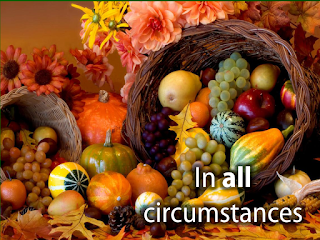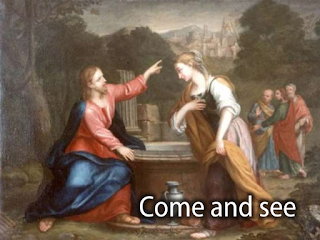Hespeler, 13 November, 2016 © Scott McAndless
John 7:37-39, Psalm 137, Ezekiel 47:1-12
| T |
here is a river, called the Gihon, that flows to this day in the city of Jerusalem. It is a small stream, but a vital one, flowing, as it does, in a part of the world where water is scarce and a reliable source can mean the difference between life and death. It is also an unusual river because it is fed by a spring, the Gihon Spring, that is unlike most every other spring in the world. It doesn’t flow steadily, you see. It is an intermittent spring. At regular intervals it surges up and then it stops.
The importance and uniqueness of this river probably had a lot to do with the beliefs that developed about it. And it seems that there were many such beliefs. The ancient Israelites almost certainly saw it as a holy place. This was not necessarily official doctrine, but it was a popular belief. It is, as I explained last week, identified as one of the four rivers that flowed from the original paradise. It was the place where they anointed their kings and a sign that God was with them. And there is even a story in the Gospel of John that indicates that they believed that, when the spring did periodically surge forth and fill a pool that had been constructed, the waters of the Gihon had healing power.
The evidence seems to indicate, anyways, that this river (together with the nearby temple of Solomon) was one of the key places where these people experienced the presence of their God in some powerful ways. And we all have such places, don’t we? I know that our official theology states that the God who we believe in is not limited by time or by space. And one thing that that means is that there isn’t any particular spot on this earth, or even in the vast universe, where God is not. But that is not necessarily how it works in our experience.
The truth is that those who have had significant experiences of God have generally found that such experiences are much easier to find (or to be surprised by) in particular places and at certain times. That is not to suggest that everyone has experiences of God in all the same places. For some, a beautiful church building such as this one where we find ourselves is the place where they have most consistently found God, but churches don’t necessarily work the same for everyone. I know many who would say that they are much more likely to encounter God walking in the woods or along a beach than in a church. But that does not change the fact that, for most of us, there will always be certain places in our world where God just seems to be closer.
Well, one of those places for many ancient Israelites was the Gihon River in Jerusalem – a holy place that was maybe second only to the nearby temple of the Lord. And, as I say, it is wonderful to have places like that in your life. But there is also a risk that comes with that. What happens when you lose such places? Does that mean that you lose your God?
This was not just a theoretical question for them. The time came when the City of Jerusalem was attacked and besieged by the armies of the king of Babylon and, despite the presence of the River Gihon within the strong walls of the city, the city could not hold out against the invaders. Jerusalem fell. It was sacked by the invaders and then reduced to rubble. Even the holy temple of the Lord, the home of Yahweh, was left as nothing but a pile of stones. And then the Babylonians did something worse, they took the people of the city and the surrounding countryside and forced them to march off to exile in Babylon which was like a world away.
Of course this was a disaster on so many levels – devastation and loss that might feel familiar to modern day citizens of Syrian cities like Aleppo. But one particularly terrible aspect of this was the loss of those places where they had experienced their God. When you lose such places and especially when you are forcibly removed from the entire vicinity, does that mean that you lose your God too?
This was an especially urgent question in ancient times because people tended to think of their gods in very simple ways. Most ancient gods were seen as being tied to particular places. The gods of Egypt, for example, were the gods of Egypt. It was just assumed that they had no power once you left the Nile Valley. And as far as the people of Israel knew, their God was the same – after all, the question of whether the God of Israel could be present in other lands had simply never come up before. So, as far as they knew, when they left Mount Zion and the Gihon River, they would not be cut off from their God forever.
In fact, they did find their God in Babylon when they got there which was probably a big surprise. It led them to rethink everything they knew about God and was an important step towards the understanding we have of a God who is not limited by time and space. But they didn’t know that when they left. As far as they knew, when they left the Gihon, they were leaving their God.
One of the people who lived through that dramatic experience was a man named Ezekiel. He was a prophet and he saw the disaster coming and that there was nothing that could stop it. And Ezekiel was very concerned about what it meant that the people might lose their God. He even had a vision where he saw a great cloud of glory, which represented the presence of God, depart from the temple, seemingly forever. (Ezekiel 11:22)
But, though God gave Ezekiel a heads up about what was coming, he also sent other messages his way – messages of hope and of new beginnings. Ezekiel had many visions during this difficult time but one of them has proved the most enduring and meaningful. Even as the temple was being threated and destroyed (or perhaps had already been destroyed – it is hard to establish exactly when he had his visions) Ezekiel received a vision of a new temple that included, as we read this morning, a renewed Gihon River.
It is his glorious vision of the river that particularly interests me today. The river he sees is a little different from the actual Gihon River. As Ezekiel sees it, it no longer flows from near the temple mount but from the very threshold of the temple itself, but that is clearly a symbolic change and we may recognize it as the Gihon.
I believe that, if you want to understand what this vision meant to Ezekiel, you have to enter into his frame of mind. What did the loss of the temple mount and of the river – these places where he and his people had met with God – mean to him? We can’t know exactly what it felt like to him, of course, but I think that we can find some ways to sympathize. I know that many of us have felt a similar sense of loss in and through the life of the church in recent decades.
You see, one of the realities that we cannot simply avoid dealing with in the church these days is change. Across the board, churches are changing and adapting their worship and their programs and activities. Many don’t like it, I realize, but it seems to be inevitable for a number of reasons. Some churches do resist all change, of course. They’d rather die than change, they say in word and in deed. They often get what they wish for and die all the quicker as unchanged as possible, but, of course, death is a kind of change too so it really does seem that change is inescapable these days.
The fear of change has become so powerful that it is driving political change. I don’t know how to explain the events that took place in the United States this past week without understanding it in terms of huge numbers of people voting as a block to turn back the clock on change that has been taking place in society. But even such a desperate reaction and backlash will not slow the pace of change. It will overtake us all. The Babylonian army that is bringing the change of everything is outside the gate and I don’t care how high Trump builds his wall, he won’t be able to keep it out.
The big problem we have with change is the same problem that Ezekiel and his friends were dealing with. We, like they, have learned to know God in certain places and at certain times. And, of course, churches on Sunday mornings and at other key moments have traditionally been one of these places where we have encountered God. The church has been our River Gihon and Holy Temple Mount. But the pace of change means that these holy places have become strange to us and we may even have lost some of them. The natural fear is that the loss of these places will mean that we have lost God.
But Ezekiel’s vision of the Gihon, as I say, is a comfort. So what does his vision say that might be helpful to us in times of such change? Well first of all, Ezekiel’s vision of a new Gihon springs, “from below the threshold of the temple.” It is a promise of God’s ongoing presence with the people. They may destroy the temple, it might be razed to the ground, and the course of the river may be fouled, but the spring will pour forth its water again.
And notice that the river, as Ezekiel sees it, no longer has that intermittent flow that he and all the people of Jerusalem would have been used to. Now it flows steadily and without interruption. This is surely a sign to us of God’s constancy for us during times of change. Everything else may change but God remains the same.
But it is not enough for Ezekiel, or for us, that the river merely continues to exist. The more important question is, how we will continue to find God in times of change. This Ezekiel is able to discover by exploring the river. First he is taken to a place one thousand cubits from the city. (That is about a half a kilometer or this distance from here to Harvey St.) Here, Ezekiel discovers, the water of the Gihon is now flowing about ankle deep. You know, just perfect for splashing around in – refreshing, pleasant and cool.
This represents how we find God again after times of great change. Our first experience of God may be ankle deep. We may be splashing around and refreshing ourselves in the water of God’s presence with us, but, in the initial stages of dealing with change, we may not find that there is a great deal of depth to our new understandings of God.
That is okay though, because Ezekiel’s vision is not finished. And what he finds is that as he moves farther down the stream and away from the familiar places and ways that he experienced God, something surprising happens – the river flows deeper and deeper until soon its flow becomes overwhelming. God is not merely promising to be with us in times of great change here, he is promising to bring us to new depths in our understanding and meaning. If we are willing to engage with God in this journey of change with openness, God is promising to reveal himself to us in new and powerful ways.
And there is an even more exciting promise than that, for we learn that as the Gihon River flows on from there, it becomes a power that is able to transform the world. So sweet and fresh is its water, we are told, that is it able to make even the toxic waters of the Dead Sea (which Ezekiel calls the Arabah) fresh and able to support huge schools of fish. Here the promise is not only that God will be with us to refresh us but that also God will flow through us to renew the whole world.
I know change is hard for all of us. It is especially hard when we see change in an institution like the church where we have so many past experiences of the presence of God. You can resist against all that change. You can fight to keep everything the same or to put everything back the way that it was. You can even vote for Trump. You can try but, given the realities we are living with today, I don’t think that you will succeed.
But if you can find a way to move with the current of change – to embrace it and let it flow through you – I think that you might find that Ezekiel’s vision has a lot of truth in it and the further you go, the deeper and more powerful your experience of God will be.
140CharacterSermon Change is hard. We’re afraid to lose God. Ezekiel’s vision of Gihon says relationships with God can deepen in such times.










